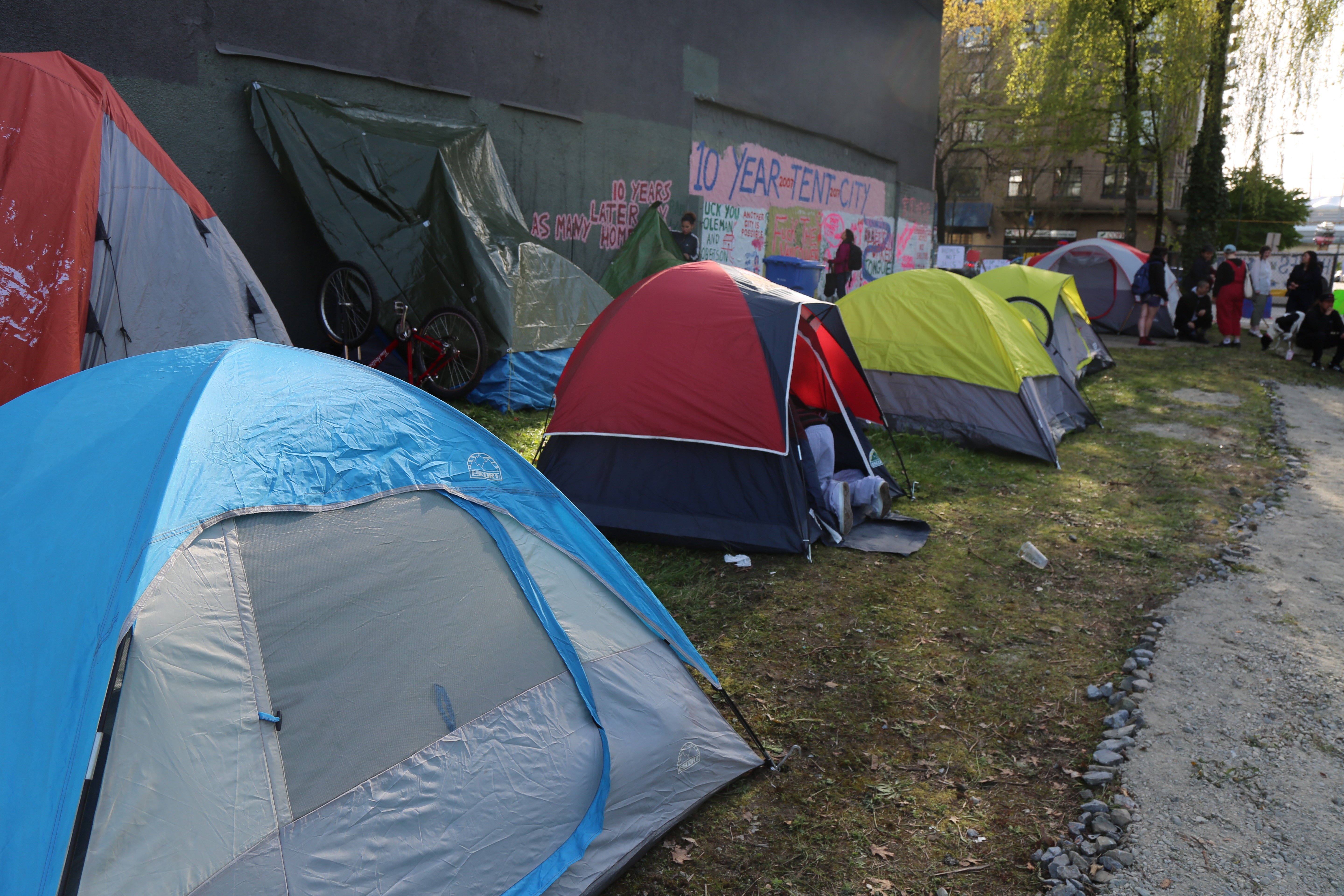Close to 500 residents of Discontent City in Nanaimo, Anita Place in Maple Ridge and Camp Namegans in Saanich are facing the threat of displacement largely on the basis of health and safety concerns often focused on fire danger at the exclusion of other health and safety risks.
Persistent homelessness, visible in the presence of tent cities throughout Canada and particularly in B.C., highlights the failure of society to ensure basic human rights and access to the basic determinants of health such as food, water, housing, social supports, self-determination and freedom from violence and discrimination enshrined in international agreements including the International Covenant on Economic, Social and Cultural Rights.
Residents of these tent cities have repeatedly claimed that living in tent cities, in the absence of other acceptable options, improves psychological and physical health including community belonging, autonomy and self-determination.
We call on all governments to shift from using public health as a rationale to displace tent cities to adopting a public health approach that treats fire safety as one factor amongst others to reduce public health and safety concerns associated with homelessness.
Overemphasizing fire safety can hide and worsen other harms
A frequent and re-occurring issue related to tent cities is safety, with increasing concerns often related to fire safety, public order and public health hazards.
In B.C., in summer, fire hazards are elevated across the province. For people who are homeless, the risk of fire is added to other risks such as violence, assault, lack of stable housing, food and food storage as well as resulting health issues. The risk of fire exists whether people live in unsheltered settings alone or in tent cities.
The “solutions” to these fire risks in tent cities across the province have been legal actions and fire orders, often with conditions that can exacerbate the harms of homelessness. For instance, in Discontent City the fire order includes a “no tarp” condition which increases exposure to heat for residents. A temperature reading in a tent with and without a tarp recently showed a five-degree difference, the latter making the tent 40 degrees Celsius. While it’s in everyone’s interests to manage fire risks, banning tarps is something we would never dream of doing in a BC Parks campsite.
Homelessness is not a consequence of bad choices, but of bad policies, including withdrawal of funding from social housing, privatization of the housing market, erosion of the social safety net, and colonization that has stripped Indigenous people of opportunities, land and resources. As well, there are systemic gaps when people exit corrections, health care and foster care and gaps between health and social systems.
The risks of fire and public disorder are often powerful narratives that fail to recognize the reality of the situation in which tent cities emerge and the conditions in which people live, and the lack of access to safe, acceptable and affordable housing and inadequate incomes. The public health hazards are a lack of adequate shelter, safe drinking water, sanitation, food and food storage as well as adequate structures to protect people from the elements and environmental hazards. All of which threaten the health of camp residents.
Five principles of a public health approach
International covenants on rights to housing and health uphold access to adequate physical structures with safe drinking water, heating and lighting, sanitation, food storage, site drainage, energy for cooking, access to emergency services, security of tenure, affordability, and habitability (liveable in terms of protection from weather and potential threats to well-being, accommodation of special physical needs with access to services and built with respect to cultural identity and diversity).
In addition to this, the International Covenant on Political and Civil Rights lays out the importance of self-determination and being able to obtain an adequate standard of living without discrimination.
Public health aims to improve conditions in which people can be healthy through health promotion, health protection, and disease and illness prevention. Canada is a world leader in population health and public health. The Ottawa Charter is an internationally recognized public health framework consisting of five principles meant to guide action to promote the population’s health and well-being. In the absence of affordable and appropriate housing, we, the undersigned, call on the provincial government to adopt a public health approach to tent cities in B.C. by adopting the following five principles:
1) Build healthy public policy
Healthy public policy means ensuring that all citizens have access to decent housing that is acceptable, culturally appropriate and at a cost that they can afford given minimum wage earnings and/or social assistance rates. In the absence of implementing evidence-based responses to homelessness, municipal governments should not construct bylaws that unfairly restrict the ability of homeless people, including those living in tent cities, to erect permanent shelter to protect themselves from the elements and provide a measure of safety and stability.
2) Create environments which support healthy living
Recognizing that people who are homeless do not have access to the basic determinants of health, environments should be organized in a way that does not create or contribute to poor health, and instead, improves it. Health protection measures include ensuring access to a safe quality and quantity of water, waste removal, food (including food storage, cooking areas and refrigeration), hygiene, prevention of communicable disease, pest control, measures to protect against exposure to cold and heat, electricity, and fire prevention — in other words, just what we all want and need. Health promotion measures include immediate housing placement offered with options, income and disability assistance as needed, and employment assistance if requested. Governments and all organizations should be working with and assisting all homeless people, including maximizing the opportunities for increased health protections possible in tent cities as well as working towards permanent solutions.
3) Strengthen community action on health
Communities themselves must determine what their needs are and how best to meet them. We must ensure that tent city residents maintain autonomy and self-determination over their homes and lives while also gaining access to health, social and public safety services. Governments and all organizations should work with tent city residents to meet their health and safety needs as well as to develop long-term solutions.
4) Help people develop their skills…
… so that they can have more control over their health. Governments and all organizations should work with people in tent cities to comply with various safety requirements, including safety orders as well as encouraging and supporting the development of peer workers in the provision of health and other services.
5) Reorient health systems…
… to promote a better balance between health promotion and curative services. Governments and all organizations should ensure that health services for tent cities focus on promotion, prevention and restorative services and include an emphasis on the inclusion of peer workers. Basic health services available to camp residents should include primary care (management of acute and chronic health conditions, wound management, immunizations, screening and assessments); mental health and harm reduction training and support (overdose management and prevention, sterile supplies); and first aid training.
A public health approach means working with residents to implement evidence-based approaches to ending homelessness rather than legal proceedings which are not evidence-based and divert resources and energy from public health solutions and even increase harms. ![]()
Read more: Health, BC Politics, Housing
















Tyee Commenting Guidelines
Comments that violate guidelines risk being deleted, and violations may result in a temporary or permanent user ban. Maintain the spirit of good conversation to stay in the discussion.
*Please note The Tyee is not a forum for spreading misinformation about COVID-19, denying its existence or minimizing its risk to public health.
Do:
Do not: